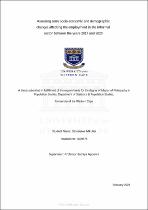| dc.description.abstract | In most developing countries, the informal workforce comprises over half of the total workforce, reaching approximately 68.5% in South Africa. This category includes self-employed individuals in informal enterprises and wage workers in informal jobs. Multiple pressures, such as escalating youth unemployment, rapid urbanization, heightened migration in economically advanced provinces, and persistent financial crises, have collectively driven the growth of the informal sector during periods of economic instability in South Africa's labour market. From a socio-demographic standpoint, this study examines the structural shifts that impact informal employment. Specifically, it evaluates how socio-demographic variables such as age, gender, ethnicity, marital status, and education are related to work within the informal sector. Moreover, this research adopts a comparative approach, assessing how these variables manifest changes in informal sector employment between 2017 and 2020. | en_US |

